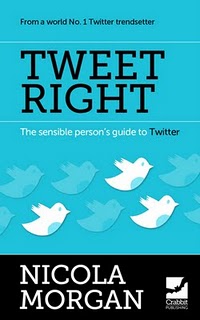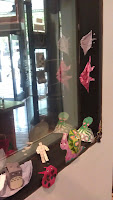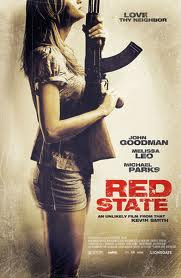Many moons ago, way back before email and wikipedia, I did Drama A-Level. I went to the library and hand-wrote essays about Brecht and Stanislavski.
I remember very little about this time (too much cider and Bjork to recall it all properly), but one thing I do remember is Stanislavski's acting method, which would later evolve, by a cunning word-switch, into method acting.
I had reason to think of this last week. Some of you may know that I have recently moved into my first owned-by-me-and-the-bank home (rather than owned by my-landlord-and-the-bank). It has been incredibly stressful (well, duh). There have been moments where my partner and I have wanted to bury ourselves under duvets and only come out once the nasty damp has gone away. I realise this isn't an effective approach to home maintenance, but at times it has been the best we've had.
Anyway, under such circumstances, it has been difficult to find the joy in writing. It has all felt very leaden, lifeless, heavy, murky, like a bad souffle, where you've forgotten the eggs.
Back to Stanislavski.

I had been working on a particularly dreadful scene. I gave up in disgust and went to my
day-job. There, I found a member of staff, a pile of cardboard and no customers.
In no time, the member of staff had turned the pile of cardboard into some cute, teeny-tiny houses, as though Kevin McCloud had visited Toytown.
My skill with the scissors couldn't run to houses, but I felt brave enough to try a kennel to go with them. Once that was mastered, I found an online guide to making an origami dog to go in it.
Our little street joined some of the other paper-craft creations that 'decorate' (also known as 'clutter') our collective workspace.
Later, when I revisited the annoying, leaden scene, I found that I was approaching it with a new lightness of heart. It seems that the act of playing made my writing more playful.
I was reminded then of Stanislavski and his belief that good acting came from finding the real emotion, rather than simply declaiming lines. In other words, you just have to feel it.
I have resolved that whenever my writing is doing it's no-egg-souffle impression, I'm going to get out the origami, or the colouring, or the placticine and remind myself of how writing should feel. It should be like playing.
And at least it will take my mind off the damp.
I'd love to hear about other creative outlets help you with your writing!
www.elencaldecott.com Elen's Facebook PageTwitter:
@elencaldecott
Sir Terry Pratchett has just won the 13th
Bollinger Everyman Wodehouse Prize for Comic Fiction. This is excellent. He is, undoubtedly, a very funny writer, and deserves it. The prize includes having a Gloucester Old Spot pig named in his honour - and doesn't every author secretly aspire to that?
Many people (including some whose judgement I respect greatly) dismiss Terry's writing as mass-market schlock, saying that his humour is infantile and his plots verge on the ridiculous. They find the covers (of the paperbacks) hideously overfull of bosomy blondes, chunky swords, ugly assorted mythical creatures and posturing musclebound heroes. Others admit to reading him, but undercover (oh, the bliss of the e-reader for allowing one to peruse a whole host of 'unsuitable' books in public!). Personally, I am an out-and-proud Pratchett fan and happy to tell anyone what they are missing out on (serious subjects and ideas such as the the power of journalism, astronomy, the Gulf War, feminism, high finance and racism are just a few he covers).
However, it's neither the fact that he's won a prize, nor the merits of his work that I want to write about today. At this year's Hay Festival, Terry described writing as
"running down a hill with wings on your back and taking flight, although sometimes you have to run up and down a few hills." Absolutely true - at least that's how it feels to me too. There are many such gems of writing wisdom out there (from a myriad authors), for those who wish to look for them, as well as reams of advice on everything from punctuation to publication. But I do wonder if there's too much. I wonder if those starting out on this writing journey are now faced with so much material telling them how to write, that they lose sight of the main objective - which is to apply bum to seat and just do it. In other words, the physical practice of setting pen to paper (or fingers to keyboard) is worth a million 'self-help' books.
Asked about the best way to write fantasy, Terry advised looking at how the best do it and told his listeners:
“do not sit around listening to me, you should be at home typing.” Absolutely. When I am asked for advice by children, I tell them I have only two essential pieces of writing wisdom to impart.
1: Read voraciously.
2: Write something every day.
For all the blogs, books, rules and tips out there, in the end, I believe that is the only writing wisdom anyone who truly has the passion to start on this mad creative rush down the hill really needs, (perhaps in conjunction with Terry's other exhortation to find your own writing voice). So I'll add in his immortal words:
3. "For Heaven's sake, don't try
The other day, I was discussing with my family whether people can change. Actually, it wasn't so much a discussion as me posing a theory, them agreeing, and then all of us providing more and more evidence. Which is pretty much my favourite kind of discussion, at least while on holiday.
My theory was that it is very difficult, very difficult, and relatively rare, for people to change themselves. (And this has an implication for novelists, as you'll see.)
Of course people do change. We know that. Any individual changes a tiny bit each day, imperceptibly, adding up to large changes over decades. Sometimes, changes can be more sudden, especially during the growing up years. Various landmarks change us: leaving school/university, having children/not having children, close bereavement, major changes of circumstances. These bring changes to our personalities over the years, and changes to our habits.
But these changes tend to be a) gradual b) an adaptation to changed surroundings/ environment/ people around us and c) largely involuntary. They do not answer the question: CAN people change? In other words, can they change when they want to? Can we often change our behaviours when we see a negative consequence, or, indeed, a positive one? (I know that people sometimes can - change addictive behaviours, for example - but they generally need a great deal of help and intervention.)
The reason I was thinking about this was because I am hopelessly useless at changing bad behaviours. How many times have I looked at the bathroom scales and said that I was going to eat less, exercise more? (Twice today, anyway.) How many times have I made resolutions to drink more water and less wine; eat more fruit and less sugar; not buy ice-cream "just in case one of my daughters comes home unexpectedly"; do an hour's writing before answering emails; say no to speaking engagements; spend less time at my desk; enjoy weekends properly; be less of a workaholic; get less cross when people are stupid; not snap at my husband (no link there to the previous remark!); do more gardening and cooking (hobbies which I love and are good for me); get up from my desk every hour? Countless times, is how many. And I never change my habits. At all.
I am utterly beholden to my adult, middle-aged personality, which happens to be that of a driven workaholic, hopelessly Type A, unstoppably entrepreneurial, unable to say no to any exciting idea that pops into my head at four in the morning. I was different when I was fourteen and will probably be different when I'm 84. But there is no discernible change between how I am now at 50, how I was when I was 40 or 30. I have a whole different life, but my bad habits and behaviours I'd dearly like to alter remain stubbornly unaltered, even though I recognise completely that changing would be good for me and probably give me a longer life.
SO, writers and readers, why oh why oh why oh why do the characters in our books always have to change and develop? Even if the action takes place over two weeks, or two days. It seems to be one of the unbreakable rules of novels.
The Carnegie Medal even has criteria for characterisation, including:
Are the characters believable and convincing?
Are they [the characters] well-rounded, and do they develop during the course of the book?
Do they act consistently in character throughout the book?
You know, it rather bugs me that a character
must develop during the course of what may be a very short timespan
A couple of months into myRLF Fellowship at the London College of Fashion, I mentioned to a friend howmuch I was enjoying it. It reminded me of how much I love teaching – the chanceto make a difference in a pupil or student’s life, to share in their learningand help them reach their full potential. Teaching, I declared, was myvocation. She was surprised. To be honest, I surprised myself. Where does mywriting fit into this? Is it just a job; another career I’ve moved into or isit something else entirely? I’ve been thinking about the answer to thisquestion – a lot.
As a bossy little girl,press-ganging my friends into an audience to listen to the poems and stories I’dwritten, I was often told by adults that I would probably grow up to be ateacher. There was certainly never any mention that I might grow up to be awriter. I don’t think that early ‘encouragement’ pushed me towards a teachingcareer, but I did train and work as a teacher for many years. The genuine encouragementcame from a careers advice teacher at the FE college where I was hurtlingtowards a job as a shorthand-typist or, at best, a private secretary. She stoodover me while I filled in the university clearing house forms and – by happy accident– found my vocation as well as a fulfilling and relatively well-paid careerwith great holidays. She was everything a good teacher should be – inspiring,challenging, supportive – and she made a huge impact on my life. I owe her ahuge debt of gratitude, although to my sadness and shame, I no longer rememberher name.
At the risk of soundingconceited, I believe I was a good teacher too. I honed my bossiness into theability to encourage – OK, push – my students to be the best they could be andI hope some of them remember me positively. I remained in education until I was eventuallypromoted to a job for which I was not suited and which I loathed. Budgetmanagement just wasn’t my thing – and I bolted.
Last Friday I met a lovely friend who is a writer and illustrator. We spent hours in a café, talking over a coffee. Now that festivities and tax are both neatly out of the way, it was a real delight to indulge in writing chat about each others possible new ideas and work, as well as the usual moans.
At one point, she mentioned listening to music while she worked. Interestingly, she could only do this while working on some piece of art, not while she was writing.
Now I know that some people write with music constantly in their ears. Some say they select soundtracks to serve their work-in-progress, which makes me wonder.
Do gritty teen/YA novelists work with hard metal and anarchism pounding through their head-phones? Or people writing for pre-teens opt for sugar-pop and Justin Beiber? Or do the big brave souls – Mr.Pullman, I may be looking at you - tackle such large grand themes with Beethoven blasting out from their stacks? I don’t know, but it makes interesting thinking
Somewhat sadly, I can’t listen to music while I’m writing. The stuff worms into my head and ears, messing up the flow, the rhythm, the music of the words. How on earth can I hear how this or that phrase sounds if there’s an alternative sound obliterating it? How can I fix the emotion in this part of my story securely into words when there’s a different emotion hammering loudly at the door? I’m glad some people can work happily that way but – rather annoyingly – it’s not a thing that works for me.
Even writers of fiction need to be able to hear the music in their work. One thing that does restore my ears – again, though not while writing – is poetry, which I’ve recently re-discovered as an activity.
I re-shelved my random collection of old poetry books in beside an odd armchair, far more conscious of making space for a large seasonal green tree than insightful workspace planning.
Yet, ever since, I’ve found myself snatching odd moments among the anthologies, greedily grabbing several writing voices at a time. It’s an amusingly mixed experience. Some poems are boring, some dreadful, some so embarrassingly of their time the should be wearing duffle-coats and some are still as breath-taking as ever. I’d recommend it as a way of waking up your writing head or even, as I did, finding a new idea.
So, are you a muso or a muser? What’s your sound of choice while you’re working? Or are you another one who needs word-whispering silence to get the work done?
And if anyone knows the name/location of the brilliant Arts-Council-funded poetry site that I glimpsed recently on Facebook but now cannot find, please, please add it to the comment box. Thanks.
The section I saw showed a soulful John Hegley speaking "Without You."
Unfortunately, I am "Without You-Tube".www.pennydolan.com
A BOY CALLED M.O.U.S.E, published by Bloomsbury.
As people who know me well will know, films come a very close second to books on my list of 'things I'd rather be doing'. I go to the cinema usually once a week and will also watch a couple on LoveFilm or on TV too.
Last week's cinema expedition was something different to the norm. I went to see
Red State by Kevin Smith. When I say 'by' Kevin Smith, that's pretty much exactly what I mean - written by, directed by, distributed by...that Kevin Smith. Even the funding for the film was raised by Kevin Smith from private donors. Once the film was made, most of his marketing was done via podcasts, personal appearances and literally schleping the film from city to city - at least in the US. This film is more the vision of one person than any I've seen in the cinema outside a short film festival.
This kind of one-man-band of filmmaking is a close equivalent to serious self-publishing. Like buying a self-published book for cold hard cash, I went to a cinema, paid the standard fee, bought popcorn, watched ads and trailers and then saw a product that came to me pretty directly from the mind of its creator. It was free of influence of studios, focus groups, distributors etc. All the people who are usually accused of forcing directors to churn out guff like
Final Destination 5 (my own personal title-stuffed-with-irony favourite). The publishing parallel to those people might be the bookchains who don't like a book's cover, or the marketing dept who don't like the main character's ethnicity. The people that are usually the subject of irate rants on writers' forums.
So, what was a 'self-published' film like?
Well, quite good.
I had thought about posting the trailer here...but it's 18-rated and so it could get me into trouble. It's on YouTube if you want a look. In a nutshell, three boys get kidnapped by a family of fundamentalist Christians and are punished for their perceived sins. Like I say, it's an 18. In the hands of a studio it would probably have been a shlock-horror, perhaps with a bit of torture porn thrown in. In the hands of a single-voice director, it is something less polished, but also strangely satisfying. Kevin Smith actually has something to say and he uses the actors as mouthpieces for his idea. Admittedly, there are over-long speeches and it's disconcerting not to have a clear hero. But it was also very refreshing indeed.
Auteurs aren't new, of course. But for most of my cinema-going life, they've been the stuff of myth. I'm much more used to studio-productions. Just as I've been used to publisher-led fiction. I wonder, will we find that the self-publishing revolution that's taking place around us will lead to auteurs making their mark in our industry too?
What? Abandoning the social networks? Me? For those of you who know me--yes, I hear your scepticism. For those of you who don't--trust me, for me to talk about abandoning Twitter and Facebook is like a chocoholic abandoning all cocoa products. So why would I do it?
Well, in the Twitter world, there is a thing known as #goingdark. This signals that one will not be around for a while--and usually, if a writer uses it, it means that they are going into self-imposed purdah to work on a project, to edit, to think. In short, to do what writers do best--create.
This, of course, is what I'm talking about--not so much abandoning the networks, as being absent from them for a while (come on, did you
really think I would jump ship?). I had a good reason for being absent for a whole month* recently--a YA novel to finish. When I'm in that race to The End, I need a head uncluttered with any distractions. My brain somehow shifts to some strange space off to the left of my eyebrow, and I walk through the world in a daze, entranced by my characters--wanting to talk only to them. It's an intense sort of conversation, and while I love chatting to my Twitter and Facebook friends (some of whom are Real World friends, and some who I know only in the Virtual World), this stage of writing, for me, is a particularly private time, and so I shut myself away with my characters and go dark for as long as it takes.

Now that I've 'finished' and am at the rewriting and fiddling stage of my novel, I'm dipping a toe in the social networking waters again. Have people missed me? Doubtful. Have I missed much? If it's important enough, someone will tell me. One thing I'm glad I didn't miss this week is the publication of
Nicola Morgan's wonderful, witty and eminently useful and sensible guide to using Twitter. It's called
Tweet Right and if any of you were thinking of venturing into that particular corner of the social networking playground, I'd strongly advise reading it before doing so. Now that I AM back, I've signed up to be one of Nicola's Twitter Angels. So if any of you want to come and see what it's all about, I'll be happy to help and advise. You can find me at
@lucycoats. Unless I've gone dark again. In which case, you won't.
* a whole month is a LONG time for one who Tweets and Facebooks much more than she probably should each day.
Lucy's latest series Greek Beasts and Heroe
The 5 Minutes for Mom Blog, blogged Mayra Calvani's book (and my illustration of it) The Doll Violinist in the ABC COntest. Check it out.
I also just saw that LauraWilliams blogged about us as well. She has a homeschooling blog called Laura Williams' Musings here. Thanks so much Laura!













I so agree that writing should feel like playing - after all, we are allowing words out of the box and discovering what they get up to when we aren't always looking.
I'm lucky - I have grandchildren, so am never short of opportunity on the playing front.
Love your origami dog and cardboard kennel! For me, I think it's photography, but we definitely need SOMETHING non-wordy sometimes to break the grip of those non-rising souffles ...
What a great idea! Stan's the man.
They are incredible cardboard houses. I love the idea of getting creating. I usually find taking the pressure off helps and going for a walk. My next venture is to make some of that book art (like this: http://mywordlyobsessions.files.wordpress.com/2012/02/anagram_octopus.jpg) I've got the book ready, but I'm afraid to begin.
I didn't know you worked at the Watershed. I go to this thing called the Steady Table there on a Tuesday night. (http://www.cypruswell.com/calendarFull.php?id=553&y=2012&m=04) Come along sometime!
Ooh, Freya, the Steady Table looks interesting! Tuesdays are no good for me at present, but will keep an eye out in case circumstances change.
Wise post, Elen, especially as people try to capture back writing time after the hols. So easy to stop all the sense of playing and end up slouching along the road, trailing the too-heavy baggage of writing at your heels.
very good comment
very good comment